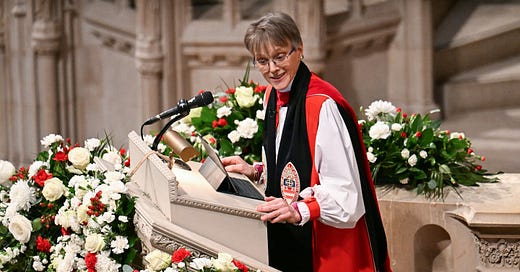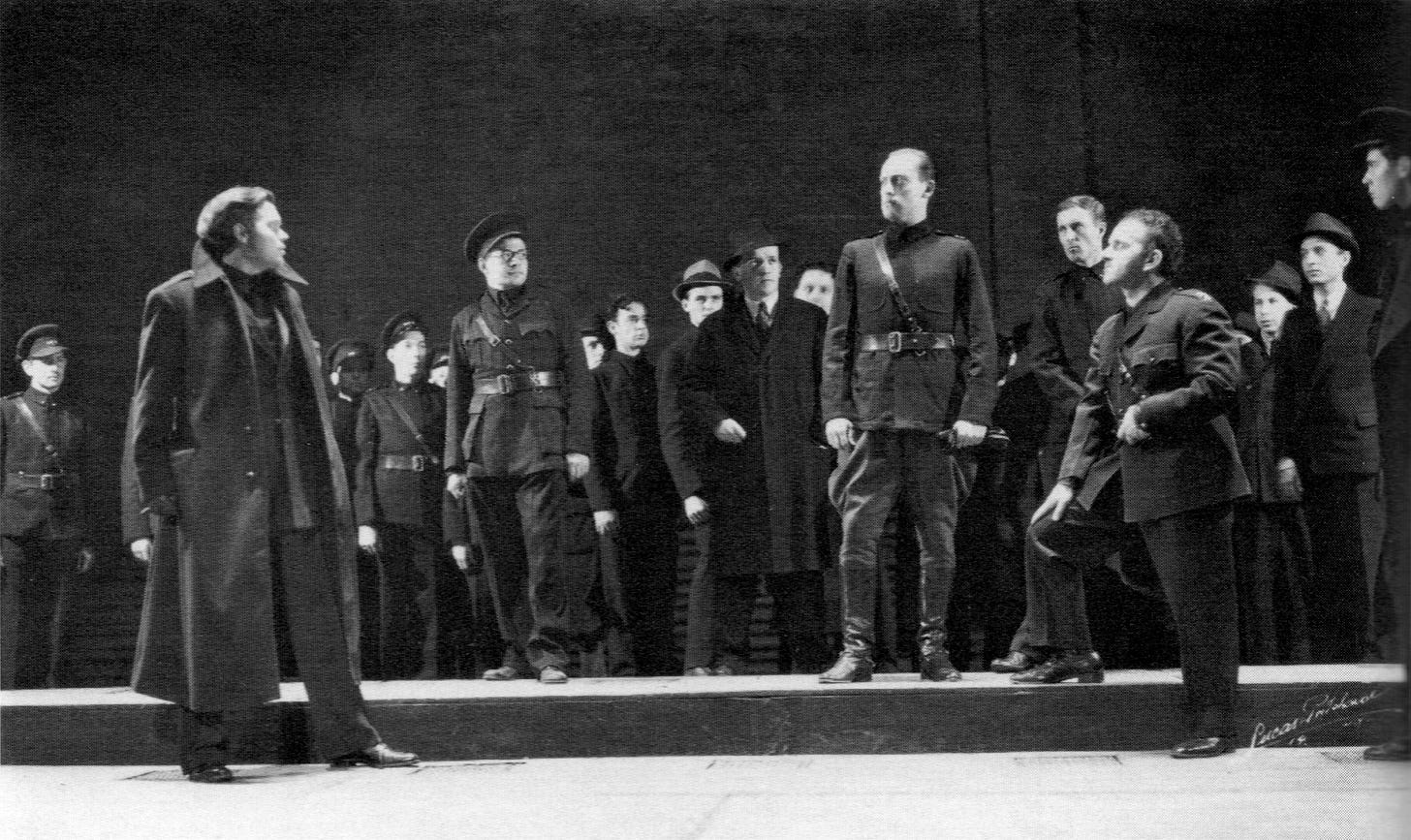Bishop Mariann Budde at the National Prayer Service, 21 January 2025.
I received an email from a friend and colleague over in the Political Science department that began with the question, “Any plans for things to do with the Trump 2.0 madness?” During Trump 1.0, he and I had taken part in a staged reading of Julius Caesar, using the script edited by Orson Welles for his notorious 1937 Mercury Theatre production.1 The reading was part of a series organized by an English department colleague, readings of plays evoking the spirit of symbolic resistance to what Trumpism represents.
What am I doing for Trump 2.0? Well, this—The Magical Humanist is a project that aims in part to be a refuge from the prevailing winds of Trumpism and the world’s revanchist turn. A refuge, but also my own expression of resistance: this page and its accompanying series of video essays2 is a way to channel my larger resolution, which is to rededicate myself to the humanities. That may seem a facile gesture at first glance, like someone who doesn’t smoke giving up cigarettes. I mean … I am an English professor—all I really need to do to dedicate myself to the humanities is show up to work.
Except that’s not what I’m thinking, not entirely. The humanities have been fighting a rearguard action for a long time now, suffering the death of a thousand cuts: literal cuts in funding, but also a slow erosion in the face of STEM’s ascendancy, an extremely online culture, and the implicit and explicit devaluation of non-instrumental (which is to say, unprofitable) creative and imaginative pursuits. And that’s not even mentioning the rise of generative A.I. and its deleterious effects on art, writing, and critical thinking.
At base, this is all a cri de coeur for the intrinsic value of the humanities, an assertion that, for all the practical and pragmatic skill sets one develops,3 it’s the intangibles that are most profound. The humanities—whether we’re talking literature, languages, sociology, philosophy, history, and so on—are really about humanity and the human condition and being human. As Terry Pratchett’s Granny Weatherwax says, the root of evil is when we start seeing people as things rather than fellow humans.
I’ve been kicking around various ideas for how to craft a mission statement for The Magical Humanist; the more I think about it, the more I’m realizing it’s something that has to be iterative, spaced over a handful of posts. I’m not one for manifestos. And it occurred to me that perhaps the best way is to latch onto circumstances or events that serve to illustrate my thinking.
So we begin with a sermon.
***
There is a great deal that has happened in this, the first week of Trump 2.0, that I’ve found distressing, enraging, appalling, and simply dispiriting; but the thing that has struck closest to my heart has been the response to the words Bishop Mariann Budde directed at Donald Trump at the end of her sermon for the Inaugural Prayer Service. On Truth Social, Trump fumed that Budde is “a Radical Left hard line Trump hater,” and “was nasty in tone, and not compelling or smart.” The service itself, he continued, “was a very boring and uninspiring one” and concluded “She is not very good at her job! She and her church owe the public an apology!”
Predictably following suit, elected Republicans also attacked Budde: on Twitter,4 Senator Bernie Moreno of Ohio called her a “woke Bishop.” Representative Mike Collins (R-Ga) tweeted “The person giving this sermon should be added to the deportation list.”5 Newly minted White House press secretary Karoline Leavitt characterized Budde’s words as “weaponizing” her pulpit. Her remarks “were egregious,” Leavitt continued, adding that Budde “should apologize to President Trump for the lies that she told.” On Fox News, Sean Hannity characterized the sermon as being “her very own deranged political beliefs” comprising “a disgraceful prayer full of fearmongering and division.”
These are the official and quasi-official responses, mind you. I haven’t had the stomach to open Twitter and see what’s being said in the fire swamps by the MAGA hoi polloi.
Reading the above attacks, one could be excused for assuming that Bishop Budde had spent her sermon attacking Trump with personal invective while waving a copy of Capital in one hand and Gender Trouble in the other. But of course, her words were nothing like that: delivered in a gentle tone, she said nothing that was out of step with Jesus’s own sermons, nothing that wasn’t entirely consonant with the Sermon on the Mount.
It’s worth quoting her plea in its entirety:
Let me make one final plea, Mr. President. Millions have put their trust in you and, as you told the nation yesterday, you have felt the providential hand of a loving God. In the name of our God, I ask you to have mercy upon the people in our country who are scared now. There are gay, lesbian and transgender children in Democratic, Republican, and Independent families, some who fear for their lives. The people who pick our crops and clean our office buildings; who labor in poultry farms and meat packing plants; who wash the dishes after we eat in restaurants and work the night shifts in hospitals. They…may not be citizens or have the proper documentation. But the vast majority of immigrants are not criminals. They pay taxes and are good neighbors. They are faithful members of our churches and mosques, synagogues, gurudwaras and temples. I ask you to have mercy, Mr. President, on those in our communities whose children fear that their parents will be taken away. And that you help those who are fleeing war zones and persecution in their own lands to find compassion and welcome here. Our God teaches us that we are to be merciful to the stranger, for we were all once strangers in this land. May God grant us the strength and courage to honor the dignity of every human being, to speak the truth to one another in love and walk humbly with each other and our God for the good of all people. Good of all people in this nation and the world. Amen.
There is nothing in this passage that is not innately familiar to my memories of being raised in the Catholic Church. Bishop Budde is Episcopalian, but the plea for compassion and empathy is ecumenical: it is, after all, the sine qua non of the guy for whom Christianity is named. But when the cruelty is the point,6 compassion is radicalism; in the Age of Trump, parishioners upbraid as “woke” pastors who quote the Beatitudes.7
The response that perhaps most exemplifies this cognitive dissonance was that of Speaker of the House Mike Johnson—given a critical mass of performatively pious Republican politicians, Johnson still manages to stand out as a caricature of Christian virtue. So while his tweet attacking Bishop Budde was utterly unsurprising, the dissonance is particularly strong with him. “Bishop Budde highjacked the National Prayer Service to promote her radical ideology,” he said. “This was an opportunity to unite the country in prayer, but she used it to sow division.”
I have self-identified as an atheist for longer than I haven’t, finally embracing the label over the more mealy-mouthed agnostic in my early twenties. I would not call myself a militant atheist by any means, however, and my only ambivalence is that I never want to be associated with such “New Atheists” as Richard Dawkins or Sam Harris.8 My atheism has little to do with the philosophical content of most religions, and everything to do with their institutions and my basic inability to take any of the take any of their mythos literally.9
All of which is by way of saying: the past ten years have offered up innumerable moments in which this committed atheist has found himself expressing sentiments and philosophies more Christian than any evinced by any of Trump’s evangelical devotees. One thing the slow creeping wisdom of age has shown me is how profoundly my religious upbringing did in fact affect me. In the more combative atheism of my younger years, I did not want to acknowledge this, but it’s true: the most basic elements of Jesus’s teachings do in fact hold the potential for humanity’s salvation, albeit not in the literal realization of the Kingdom of Heaven. Loving your neighbour, doing unto others, holding kindness as your governing rule, obliging the powerful to be charitable to the powerless—this is all a rejection of the worldview of which Trump is the crudest and most vulgar distillation, namely, seeing the world as a zero-sum game. As Terry Pratchett memorably quipped, the spirit of most religious thought can be boiled down to the credo of Bill and Ted.
Be Excellent to Each Other.
Because otherwise, what are we doing?
NOTES
Coming soon, I promise! We’re waiting on a small but important bit of hardware to arrive. I recorded my first script, but apparently my plosives are, well, quite plosive, and my wife—who is doing all the stuff on the audio/visual end—has declared the need for a pop filter to mitigate my tendency to pop my consonants. The first attempt to order one has apparently gotten lost enroute; the second attempt should arrive soon.
Critical reading, critical writing, argumentation, research practices and methodologies, language skills, lateral thinking … the list goes on.
My policy on Twitter’s name change is simple: I will call it by Elon Musk’s preferred name when he stops deadnaming his trans daughter. This is not an original sentiment or stance, but one I heartily endorse.
Precisely where the New-Jersey born bishop should be deported, Collins did not specify.
I will never not take the opportunity to cite Adam Serwer’s insight into the motive force and determining logic of Trumpism. “The cruelty of the Trump administration’s policies, and the ritual rhetorical flaying of his targets before his supporters, are intimately connected,” he wrote in The Atlantic almost six years ago, at approximately the midpoint of Trump’s first term. The MAGA ethos, such as it is, “is built by rejoicing in the anguish of those they see as unlike them, who have found in their shared cruelty an answer to the loneliness and atomization of modern life.”
This is something chronicled by Tim Alberta in his excellent book The Kingdom, the Power, and the Glory: American Evangelicals in an Age of Extremism—congregations is deep red counties and districts finding the actual words of Jesus anathema to their veneration of Trump and Trumpism.
As Michael Berubé, one of my academic heroes, once quipped: “The New Atheism seems an awful lot like the old atheism, except that it involves acting like a dick.”
In the spirit of what I say above about my mission statement emerging iteratively, I will undoubtedly explicate my atheism more thoroughly in the future.
REFERENCES
“Trump World descends on bishop who pleaded for ‘mercy’.” https://thehill.com/homenews/administration/5103756-trump-denounces-bishop-budde-mercy-plea/
“Trump’s angry response to a viral sermon should worry all Christians.”
https://www.msnbc.com/opinion/msnbc-opinion/trump-bishop-budde-sermon-truth-social-rcna188764
“What Did The Bishop Say To Trump During The Inaugural Prayer Service? Here’s The Full Transcript.”






